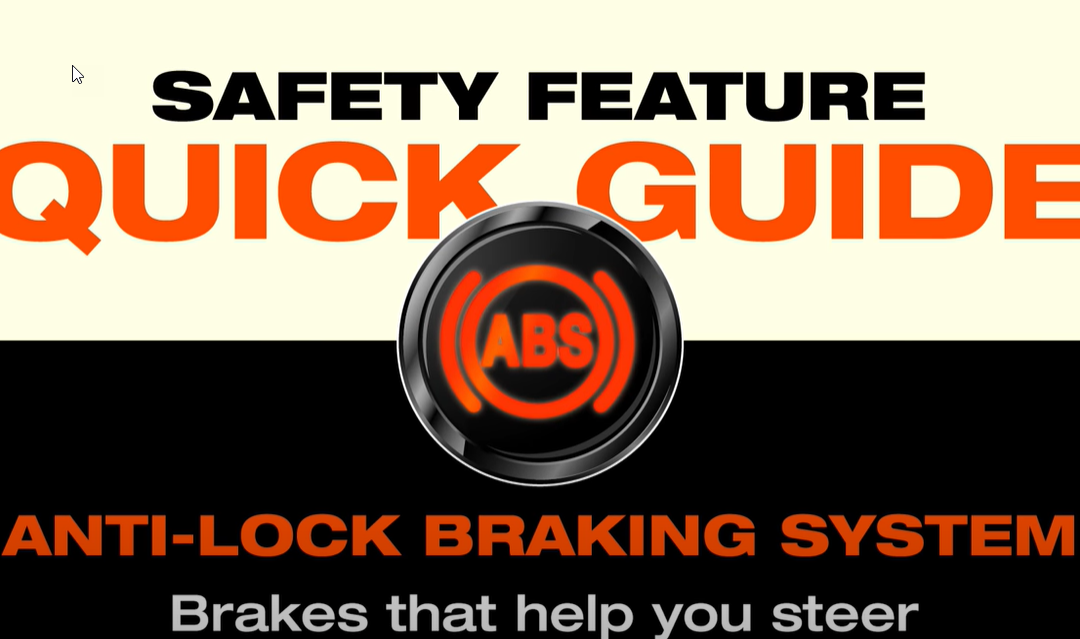
Your vehicle’s anti-lock braking system (ABS) is a critical safety feature that can mean the difference between avoiding an accident and being involved in a serious collision. While most drivers are familiar with the basics of ABS, understanding how it works, common issues that can arise, and proper maintenance requirements is crucial for ensuring this essential system functions optimally when you need it most.
Have you noticed the ABS warning light illuminated on your dashboard? Perhaps your brakes seem to lock up under hard braking on slick surfaces? Or maybe you’ve felt a vibration or pulsing sensation through the brake pedal when the ABS engages? Symptoms like these could indicate an ABS malfunction. In this comprehensive guide, we’ll dive deep into the inner workings of the anti-lock brake system, explore troubleshooting tips for identifying and resolving common ABS problems behind issues like these, and provide expert advice on maintaining your vehicle’s anti-lock brakes for maximum performance and longevity.
Buckle up and get ready to gain insider knowledge that will empower you to keep your ABS in top shape.
ABS – The Origins
While anti-lock braking systems are now ubiquitous on modern vehicles, the technology has roots tracing back to early pioneering work by German engineers. The first official recognition of an ABS concept came from German engineer Karl Wässel, who patented a system for modulating braking power way back in 1928. Though Wässel never produced a working product, his ideas planted the seeds.
It wasn’t until the late 1970s that ABS made the leap from theory to reality on production cars. Mercedes-Benz took the pioneering step of offering Bosch’s four-wheel anti-lock brake system as an option on its W116 models beginning in 1978. This paved the way for ABS to become standard equipment on all Mercedes vehicles by 1987.
Other automakers quickly followed suit, with Lincoln making ABS standard in 1993 models. The motorcycle world also embraced ABS innovation, as BMW introduced the first motorcycle with an electro-hydraulic ABS system on its K100 model in 1988. Manufacturers like Yamaha, Honda, Suzuki and Harley-Davidson subsequently rolled out ABS options over the next two decades.
While the basic operating principles remain the same, modern ABS systems have evolved into exceptionally sophisticated safety components compared to those earliest prototypes. But their fundamental role of preventing wheel lockup is a critical legacy of those early German brake innovators.
How ABS Works – Explained to Automotive Enthousiasts
Your vehicle’s anti-lock braking system is an engineering marvel designed to improve safety and prevent loss of control during heavy braking situations. At its core, ABS is composed of several key components working in harmony – wheel speed sensors, a hydraulic control unit, and the ABS computer module.
The wheel speed sensors are tasked with constantly monitoring the rotational speed of each wheel. This data is fed into the ABS computer, which acts as the brain of the system, analyzing the information in real-time.
During normal braking, when a wheel begins to slow down faster than the others, indicating it is about to lock up, the ABS hydraulic unit reacts swiftly. It reduces brake pressure to that wheel, allowing it to regain traction. This cycle happens rapidly, with the system making adjustments multiple times per second.
By preventing wheel lockup, ABS allows the driver to maintain steering control during hard braking. It also helps the tires maintain grip on slippery surfaces like wet or icy roads where lockup is more likely to occur with traditional brake systems.
Practical Tip: Always allow a greater following distance in poor weather conditions, as ABS requires more stopping distance than normal braking on high-traction surfaces. Here’s why:
How ABS Works – Explained to a 5th Grader Riding a Bike
Imagine you’re riding a bicycle on a dry, paved road. If you slam on the brakes, the tires will skid and lock up, but you’ll stop pretty quickly. That’s like normal brakes working on a high-traction, dry surface.
Now, picture riding that bike on a slippery road covered in mud or ice. If you brake hard, the tires will just slide without gripping the ground. You’ll keep sliding for a longer distance before finally stopping.
ABS is kind of like putting special brakes on your bike that make the tires pulse and regain traction instead of just locking up and skidding out of control. But just like on the mud or ice, those pulsing tires can’t grip the slippery road as well as locked tires on dry pavement.
So with ABS, your tires don’t completely lock up, which helps you steer away from obstacles. But the trade-off is it takes a little bit farther to come to a complete stop compared to a high-traction situation. That’s why you need more following distance when driving on wet or icy roads!
Common ABS Anti-Lock Braking System Issues and Troubleshooting
Even an anti-lock braking system as complex as modern ABS can experience issues that are simple enough for your 80-year-old grandma to detect. While technical culprits like failed wheel speed sensors, wiring faults, or hydraulic control unit problems may be the root causes, grandma will likely notice some telltale signs first. Her eyes may catch that ominous ABS warning light glowing on the dashboard. Her feet will feel an unusual pulsing from the brake pedal, even when stopping on dry pavement. And her ears may pick up odd grinding or whirring noises from the wheel wells during braking.
More subjective symptoms grandma could notice? Longer stopping distances than normal, even in good conditions, could hint at an ABS system unable to prevent wheels from locking up effectively. Pay close attention to any changes in brake pedal feel or abnormal car behavior when slowing down – your keen senses can often detect when something isn’t quite right long before dashboard lights illuminate.
Practical Tip: If the ABS light is on but no other drivability issues exist, there may be a simple electrical fault or system trouble you can have scanned for codes to isolate potential causes. However, if any of these signs do occur, do not attempt to diagnose or repair your braking system yourself – ABS is for professionals only, and a visit to your trusted auto garage becomes an absolute must.
While these symptoms are straightforward to identify, properly diagnosing and repairing an intricate ABS system is best left to the professionals to ensure safe and reliable operation.
ABS Maintenance and Service Recommendations
Like any vehicle system, your anti-lock brakes require regular maintenance to ensure optimum performance and longevity. Neglecting routine care can lead to accelerated wear, expensive repairs down the road, and compromised safety.
Brake Pads/Shoes & Rotors
The brake pads/shoes that provide the clamping force and rotors they grip are key wear items that must be inspected. Most manufacturers recommend inspecting pad/shoe thickness every 12,000 miles or 12 months. Excessively worn pads can damage rotors requiring replacement as well.
Wheel Speed Sensors
These are the “eyes” that feed wheel speed data to the ABS computer. Any issues like damage, corrosion or misalignment can negatively impact ABS operation. Having them inspected annually is advised.
ABS Anti-Lock Braking System Brake Fluid Flushes
Over time, brake fluid can become contaminated and degrade. This compromises brake system performance and internal corrosion protection. Most automakers recommend a complete brake fluid flush every 2-3 years.
Practical Tip: When replacing components like brake calipers or the ABS module, inquire about any recommended brake fluid specification changes to ensure optimal compatibility. If you’re servicing your vehicle at a CAA-certified auto garage like Autotech Performance, you can rest assured that we automatically check for and adhere to the appropriate brake fluid requirements during regular maintenance.
ABS Module/Hydraulic Systems
The ABS computer module, pump, and valve systems are the brain and muscle. Any leaks, corrosion or electrical issues require professional diagnosis and repair to restore function.
By adhering to the maintenance schedule laid out in your owner’s manual, you’ll maximize the effective service life of brake system parts and optimize ABS performance when you need it most. Defer repairs and you may be faced with a bigger, more costly problem down the road – or an ABS failure at the worst possible moment.
Rather than attempting to inspect or service your vehicle’s ABS components yourself, it’s highly advisable to have the trained professionals at an automotive garage like Autotech Performance (westislandgarage.ca) perform regular inspections and any needed maintenance. Investing a modest amount for their expert care and following the manufacturer’s service recommendations is your best insurance policy for keeping this critical safety system operating as designed for years to come.
Don’t Let ABS Anti-Lock Braking System Issues Catch You Off Guard
Your vehicle’s anti-lock braking system is an engineering marvel that has revolutionized automotive safety. But like any complex system, ABS requires proper maintenance and attention to potential issues to ensure it can perform when you need it most.
In this comprehensive guide, we’ve walked through the inner workings of how ABS prevents wheel lockup, the common problems that can afflict the system, and the easy-to-spot warning signs even your grandma could identify. From illuminated dash lights to strange noises and pedal pulsations, being attuned to ABS symptoms is crucial.
We also covered the importance of adhering to recommended service intervals for key ABS components like brake pads, rotors, sensors, and fluid flushes. Neglecting this vital maintenance can lead to accelerated wear, expensive repairs, and compromised safety should an ABS failure occur.
Remember, while some ABS trouble signs are straightforward, the proper diagnosis and repair of this complex system should always be trusted to the experts. The professionals at Autotech Performance (westislandgarage.ca) have the specialized knowledge to inspect, service, and restore your anti-lock brakes to peak operating condition.
Don’t let ABS issues catch you off guard. Stay proactive about maintenance, and book an appointment with our experts. Heed the warning signs, and keep this critical safety system in top shape by scheduling regular service from the anti-lock brake specialists. Your life and the lives of others on the road depend on it.



